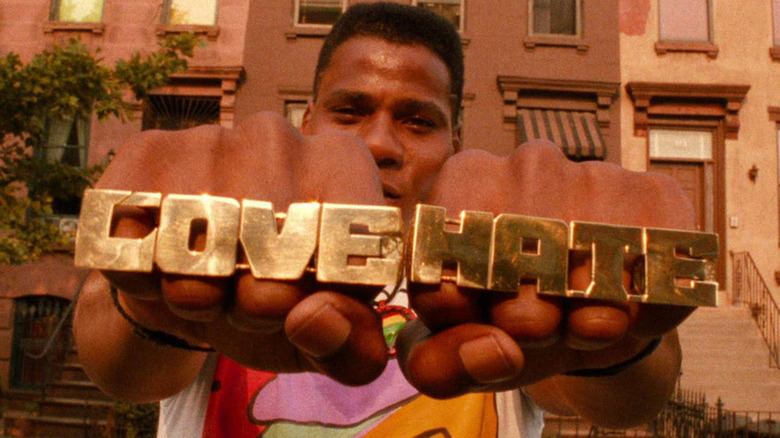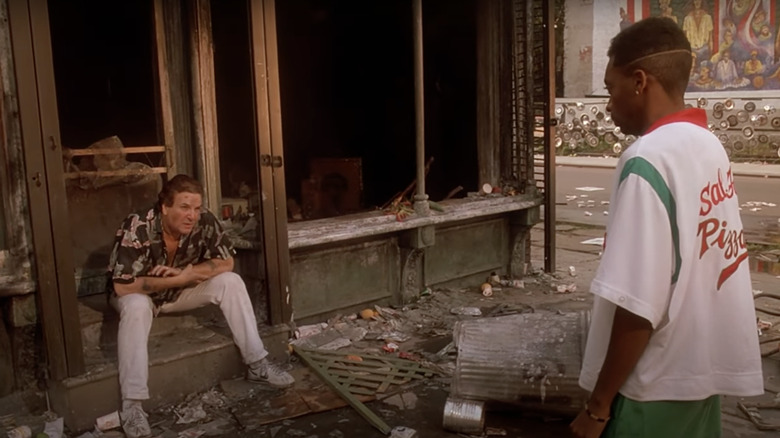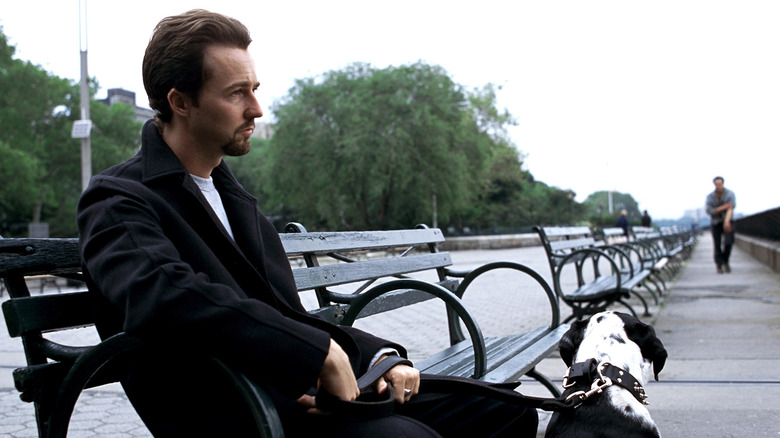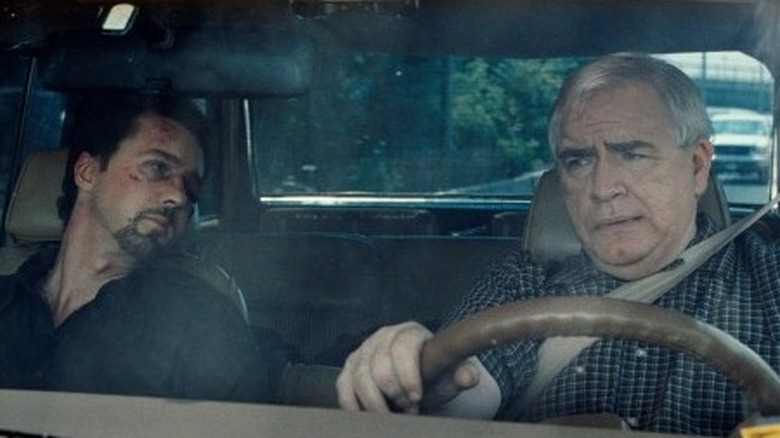Do The Right Thing Had A Massive Influence On Edward Norton's Aspirations
Edward Norton is a brilliant actor — and he knows it. He cares about the projects he takes on and he's controlling about how they're made. The final cut of "American History X" was even one that he edited, much to director Tony Kaye's dismay. Norton has thus developed a reputation as an actor who's difficult to work with. Norton's one-time "25th Hour" co-star Brian Cox wrote of him, "He's a nice lad but a bit of a pain in the arse because he fancies himself as a writer-director." Norton's "my way or the highway" attitude is also known to have cost him his role as the Incredible Hulk.
There are directors who Norton respects, though — game recognizes game. One of them is the man who directed him in "25th Hour": Spike Lee. Speaking to GQ and recalling "25th Hour," Norton was downright effusive in his praise for Lee:
"I think we shot '25th Hour' in 26 days [...] it was the shortest schedule I've ever shot a film on, and it's a function of Spike's preparation, he's one of the most prepared directors and part of that is rehearsal, he rehearsed it like a play, 5-6 weeks, 9-5 everyday. [Philip Seymour Hoffman] and I were in heaven, we were like, 'This is everything we love.'"
He also revealed that seeing Lee's magnum opus, "Do The Right Thing," was one of his formative points as an artist.
Doing the right thing
Set in a Brooklyn neighborhood on a blistering summer day, "Do The Right Thing" shows the escalating antagonism between local pizzeria proprietor Sal (Danny Aiello) and his African-American patrons. The main character is Sal's deliveryman Mookie (Spike Lee himself). Edward Norton doesn't specify when he first saw "Do The Right Thing," but he was 19 when it first opened in 1989. That's a ripe age for a great movie to affect you and affect Norton it did:
"'Do the Right Thing' was, to me, one of the definitive films of my coming of age, it had an enormous, enormous impact on literally what I thought was the reason to make movies, like it changed my aspirational target."
The influence of "Do The Right Thing" could be what drew Norton to "American History X," another story about racial hatred in America. "X" doesn't come close to the authenticity of Lee's film, but both movies end by showing the cycle of destruction. Of course, Norton's other aspiration was to work with Lee himself:
"I had literally written Spike fan-letters, I thought 'He Got Game' was a frigging undeclared masterpiece, I thought it was just great and I think I wrote him a letter about that, then when I saw him somewhere sometime he came running over and we got into it and then you know we started looking for something to do."
That something came in "25th Hour." The story started as the debut novel of David Benioff, telling the tale of drug dealer Monty Brogan and his last 24 hours before he reports to prison. Lee directed the movie, Norton starred as Brogan, and they turned a good book into a great film.
Righteous anger
"25th Hour" was published in 2001 while the movie came out in 2002, just over a year after the 9/11 attacks. Instead of setting the story in the novel's pre-9/11 New York, Spike Lee embraced the hurt his hometown was feeling and wrapped it into the story's already-present melancholy. The movie even adds a scene where Monty's friends Jacob (Phillip Seymour Hoffman) and Frank (Barry Pepper) look at the sight of the fallen Twin Towers from the latter's apartment. Edward Norton told GQ:
"I think Spike was not going to make that movie in the aftermath of 9/11 and not deal with the melancholy that was sitting on his town. Spike makes films about the moments he's living in, he makes films about the tensions in his neighborhood, he makes films about what's the moral challenge of the moment we're living in."
Norton acknowledged that "25th Hour" works as a morality tale, one which asks how much culpability we have in the decisions of those around us. However, what elevates Lee's film is its righteous anger; the same anger that struck Norton in "Do The Right Thing." Aside from the acknowledgment of 9/11, the film throws in some middle fingers at Bush/Cheney and Enron.
Mutual respect
Edward Norton clearly respects Spike Lee, but even that wasn't enough to suppress his creative (and controlling) tendencies. In Brian Cox's autobiography, "Putting The Rabbit in The Hat," he recalled how Norton once pitched script edits to Lee during production on "25th Hour." How the discussion went down may surprise you. Cox, as big a fan of Lee's as Norton is, wrote:
"I've never known a director to be so diplomatic [...] [Norton] and I had this scene set in the bar owned by my character. Spike set it up immaculately, but Ed came in and was saying, 'Now, I've done some work on the script and I've got a few ideas and I'd like you to think about them. I've rewritten a few things in there.' Spike was like, 'Oh, good, let me see.' He had a look at Ed's notes and then said, 'Well that's very interesting. Okay, so what we're going to do now is ...' and put Ed very firmly in his place. It was done beautifully. Seamless. It was taking Ed's points on board but making sure Ed knew that we were doing things his way.
Yes, the same Edward Norton who hijacked the production of "American History X" to make it his way didn't try to overrule Lee, he just accepted his direction. Lee giving Norton's notes the benefit of the doubt, and Norton accepting Lee's verdict, is a testament not just to the director's diplomacy, but of the two men's mutual respect. Game recognizes game, indeed.



